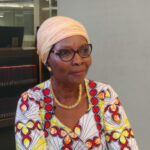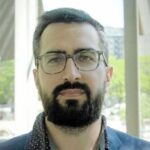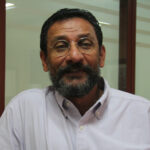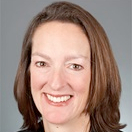BANK OF EXPERTS
CHOQUET, Sabine — Ph. D.
Associate Professor at the Montréal Institute of International Studies (IEIM-UQÀM), Sabine Choquet is Researcher in Political Anthropology, as well as Researcher and Secretary General of the Centre d’Études des Radicalisations et de leurs Traitements (CERT) of the Université Paris-Diderot. Holder of a doctorate from La Sorbonne, a doctorate in humanities from Université Laval and a ‘Habilitation’ to lead anthropological research from the University of Fribourg, Ms. Choquet focuses her work on minority rights, cultural, linguistic and religious diversity management policy, collective identity, radicalization mechanisms and violent extremism prevention policy. She mainly studies Canada, Switzerland, Malaysia and Lebanon. Mrs. Choquet is the recipient of various international research prizes, including the first prize for Political Book of the Year in 2012 (Fondation Jean-Charles-Bonenfant), and numerous excellence-based awards, including the Marie Curie Fellowship. She is the author of Unis par la diversité – Ces pays forgés par leurs différences (2018) et Identité nationale et multiculturalisme : deux notions antagonistes ? (2015). Two years ago, she founded an international consortium on the evaluation of radicalization prevention systems. To this day, she is still involved in the consortium. Mrs. Choquet is an associate member of the UNESCO-PREV Chair.

COOLSAET, Rik — Ph. D.
Rik Coolsaet is Professor Emeritus of International Relations at Ghent University (Belgium) and Senior Associate Fellow at Egmont–Royal Institute for International Relations (Brussels). From 2002 to 2009 he served as Director of the ‘Security & Global Governance’ Program at the Egmont Institute. He has held several high-ranking official positions, such as deputy chief of the Cabinet of the Belgian Minister of Defence (1988–1992) and deputy chief of the Cabinet of the Minister of Foreign Affairs (1992–1995). He has been conducting and coordinating research on terrorism and radicalisation since 2003. He was appointed a member of the original European Commission’s Expert Group on Violent Radicalisation (est. 2006) and the subsequent European Network of Experts on Radicalisation (ENER). His current research deals with the foreign fighters issue, the vicissitudes of the concept of radicalization, and right-wing extremism and terrorism.

COULIDIATI-KIELEM, Justine — Ph. D.
Dr. Coulidiati is the first Regional Coordinator of the G5 Sahel Women’s Platform, a member of the NGO Leaders for Peace and a founding member of African Women in Mathematics (AWM). She is a lecturer at the UFR in Economics and Management at the Thomas Sankara University in Ouagadougou, Burkina Faso. She is the founding president of the Action Group for the Promotion, Education and Training of Women and Girls (GAPEF), which fights for the rights of women and girls and to increase women’s essential contribution to peace. In the context of the bloody community crisis in Yirgou, with young people and women leaders, she successfully led the social dialogue for forgiveness and reconciliation among communities in conflict. She has carried out several works and advocacy with the United Nations and high-level international, sub-regional and G5S countries to increase women’s involvement in conflict resolution and peace building. Mrs. Coulidiati-Kielem is an associate member of the UNESCO-PREV Chair.

DJOUADI, Chafiaa — Ph. D.
Urban Planner, Architect and Doctor in human geography, Chafiaa Djouadi is Researcher and European Projects Manager in prevention of radicalization leading to violence at the EFTS Mixed Reasearch Unit. Specifically, she works among the “Radicalities and regulations” team of the Maison des sciences de l’Homme of Toulouse CNRS. An expert in public policy and sustainable development, she has worked for governments and international organizations (UNDP, UNICEF, BADEA, AU, etc.) to promote the peaceful and violence-free development of Africa. She is Peace Ambassador for the Peace and Security Council of the African Union (UN Security Council resolution 1325) and acts as a mediator in preventive diplomacy and conflict resolution. Ms. Djouadi is an election observer for several African countries. In this role, she aims to analyze the engagement of women in political life and in the promotion of peace. Mrs. Djouadi is an associate member of the UNESCO-PREV Chair.

DUCOL, Benjamin — Ph. D.
Assistant Director General of Strategic and Scientific Development at the Center for the Prevention of Radicalization Leading to Violence (CPRLV) in Montréal, Benjamin Ducol has a doctorate in political science from Université Laval and was a postdoctoral fellow at the International Centre for Comparative Criminology (ICCC). He is Associate Professor at both the École de criminologie of the University of Montréal and the Department of Social and Public Communication of University of Québec in Montréal (UQÀM). His research focuses on militant radicalness related to jihadism, radicalization processes in the digital age, issues related to the prevention of violent radicalization and mobilizations of victims of terrorism. He is affiliated with the Canadian Network for Research on Terrorism, Security and Society (TSAS), the International Centre for Comparative Criminology (ICCC), the ANR – Violences et radicalités militantes (ANR VIORAMIL) and the International Panel on Exiting Violence (IPEV). Mr. Ducol is an associate member of the UNESCO-PREV Chair.

DURAIAPPAH, Anantha — Ph. D.
Dr Anantha Duraiappah is the inaugural Director of the UNESCO Mahatma Gandhi Institute of Education for Peace and Sustainable Development (MGIEP) based in New Delhi, India, in 2014. A science-policy pacesetter, with over 35 years’ experience, he now plays a key role in positioning MGIEP as a leading science and evidence-based research institute on education for peace, sustainable development and global citizenship. He leads the Institute’s unique application of social and emotional learning to the prevention of violent extremism through youth-led research reports, unique digital online courses and capacity-building activities, intergenerational dialogues leading to policy briefs, and the innovative use of digital games for peace-building. Additionally, Dr Duraiappah is a Fellow of the World Academy of Arts and Sciences (WAAS), a Fellow of The World Academy of Sciences (TWAS), visiting professor in the Urban Institute at the Kyushu University, Japan and Co-Chair of The International Science and Evidence based Education (ISEE) Assessment that contributes to re-envisioning the future of education for human flourishing.

EKSTRÖM, Anna
Anna Ekström is an expert on issues involving extremism and protection of frontline workers. She is affiliated with the Institute for future studies in Sweden, and is the Swedish lead on the project “Evaluation support for countering extremism on a local level” together with Dr. Savoia at Harvard T. Chan School of Public Health and coordinates the research project “Violent threats and security” together with colleagues in Sweden and Canada with the aim to establish a network of researchers on the nexus of violent extremism and crime. Furthermore, she is an advisor to the Swedish national police on violent crimes and doing research and advice on issues relating to the protection of personnel and unlawful influence. Anna has a long experience from working with law enforcement and crisis management and as an advisor to the Swedish national coordinator to safeguard democracy against violent extremism.

EL-HAGE, Habib — Ph. D.
Director of the Research Institute for the Professional Integration of Immigrants (IRIPI), Habib El-Hage is a practitioner and researcher in the field of intercultural relations. Holder of a doctorate in sociology from University of Québec in Montréal (UQÀM), M. El-Hage focuses on prevention, intervention and mediation practices in private and public institutions. He is Associate Researcher at the Centre de recherche sur l’immigration, l’ethnicité et la citoyenneté (CRIEC) and a member of the Research and Action on Social Polarizations (RAPS) team at the SHERPA Research Institute of the Montréal West Island Integrated University Health and Social Services Centre (MWI IUHSSC). Lecturer in the master’s program in intercultural mediation at the University of Sherbrooke, Mr. El-Hage has been working in the field of education for 19 years. He has taken part in several research projects on radicalization and recently published the results of a study on the multiple barriers experienced by racialized LGBTQ people in Montréal, as well as a book on intercultural intervention in a college environment. Mr. El-Hage is an associate member of the UNESCO-PREV Chair.

ELLIS, Heidi — Ph. D.
Heidi Ellis, Ph.D., is an Associate Professor in Psychology and Psychiatry at Harvard Medical School and Boston Children’s Hospital, and a licensed clinical psychologist. She is also the Director of the Refugee Trauma and Resilience Center at Boston Children’s Hospital, a partner in the National Child Traumatic Stress Network. She is PI of a multi-site, longitudinal research project examining developmental pathways to and away from violence, co-leads a multidisciplinary expert resource group on the topic of the repatriation and reintegration of children from formerly ISIS-controlled territories, and is co-developer of the trauma treatment model Trauma Systems Therapy. She also directs the Massachusetts Area Prevention Framework, a multidisciplinary approach to preventing targeted violence and terrorism among adolescents.

EMERSON-KEELER, Rebecca
Rebecca is an experienced consultant, with almost twenty years working on gendered drivers of extremism in conflict and fragile states as a manager, evaluator and technical advisor. After starting her career working on humanitarian protection, gender-based violence and human trafficking, Rebecca specialized in prevention of violent extremism, auditing conflict and gender-sensitive interventions, providing strategic policy advice and building private and public sector capability in the UK, Canada, EU, Africa and the Middle East. Rebecca has supported large programmes integrate the nexus of violent extremism and strategic communications, human rights, peace-building, security and macro-fiscal reform and has evaluated large communication and social media programmes focused on prevention violent extremism. Rebecca is a Senior Advisor on Gender and Conflict for the UK government and runs her own small consulting company.

